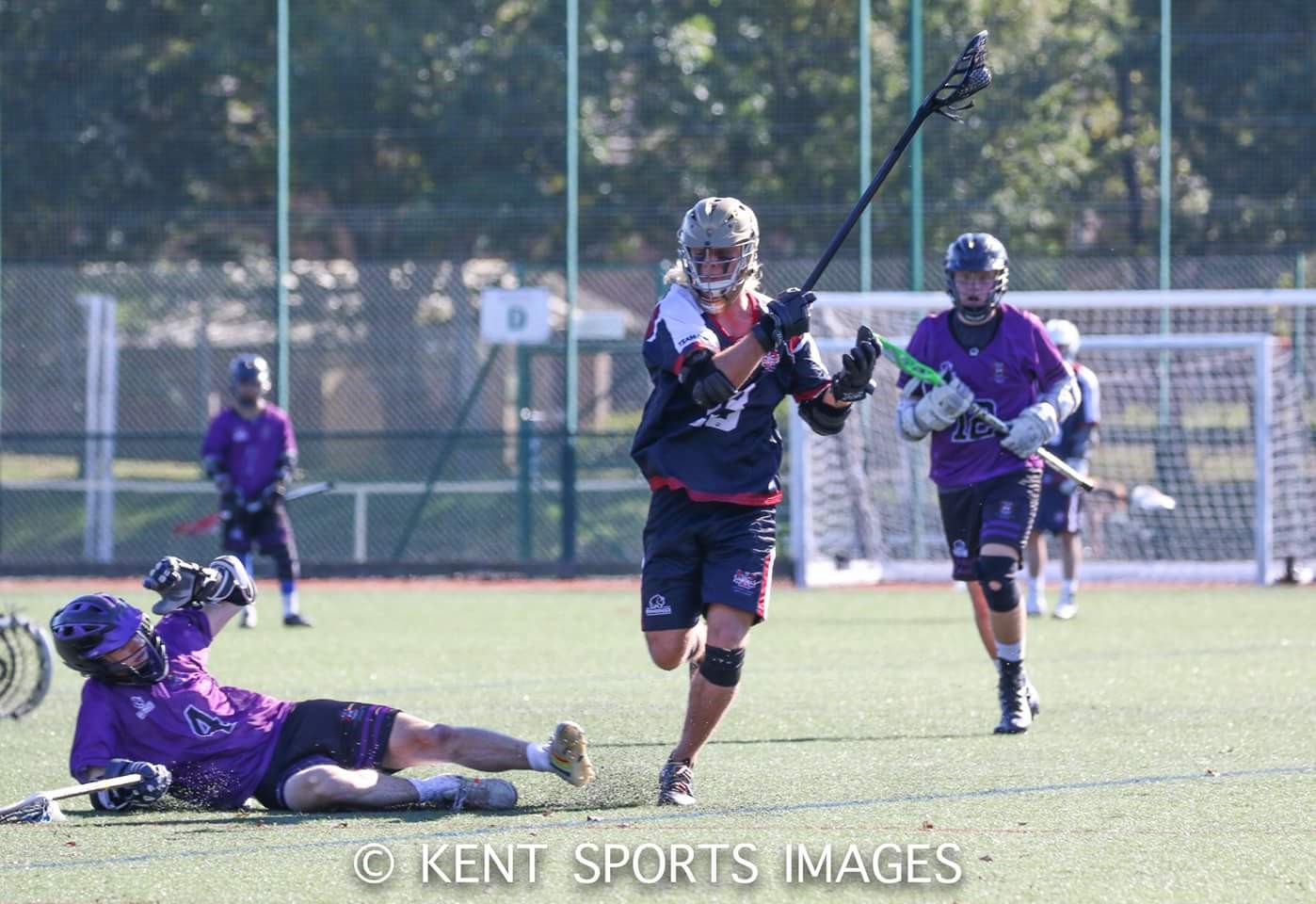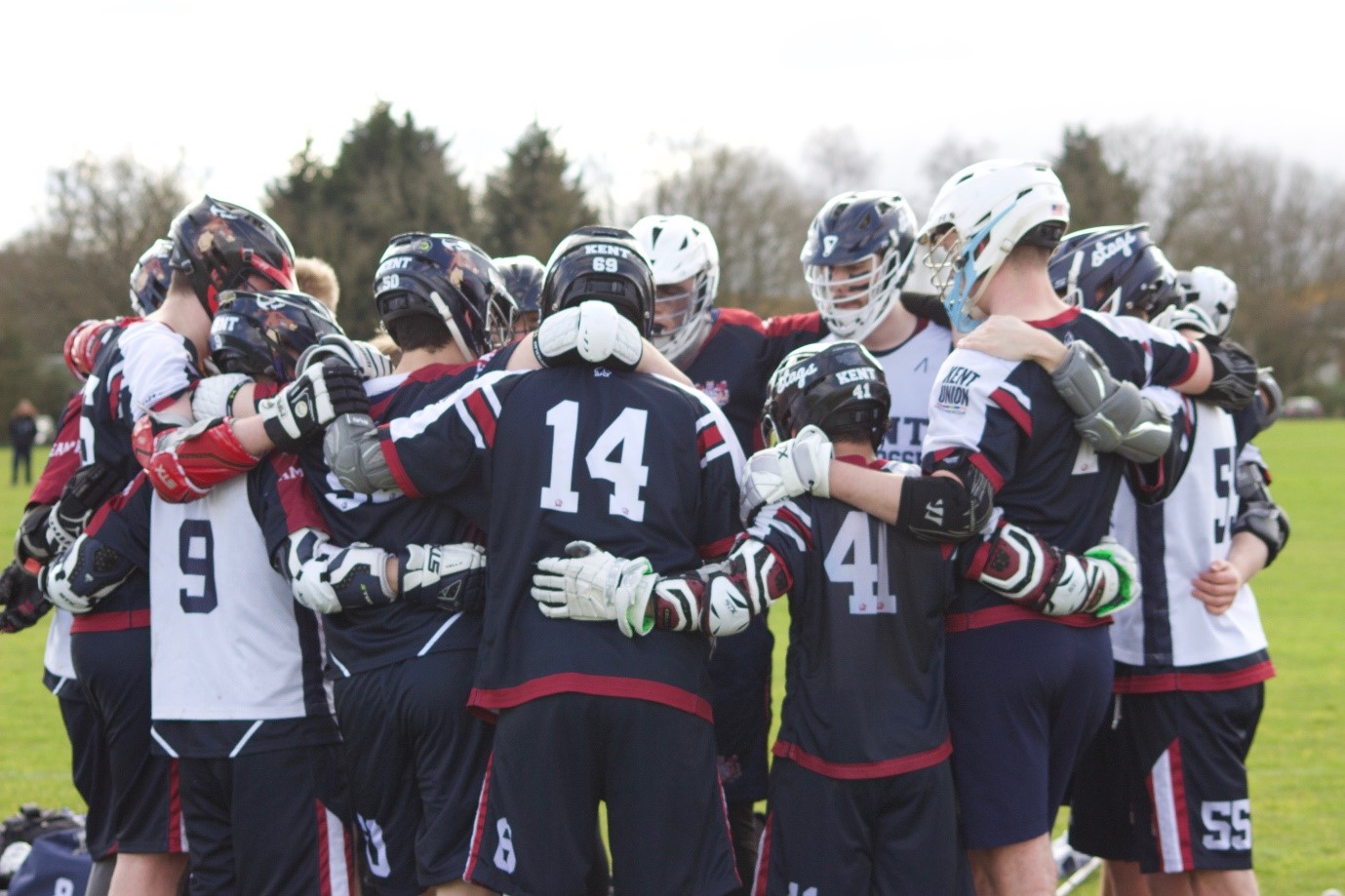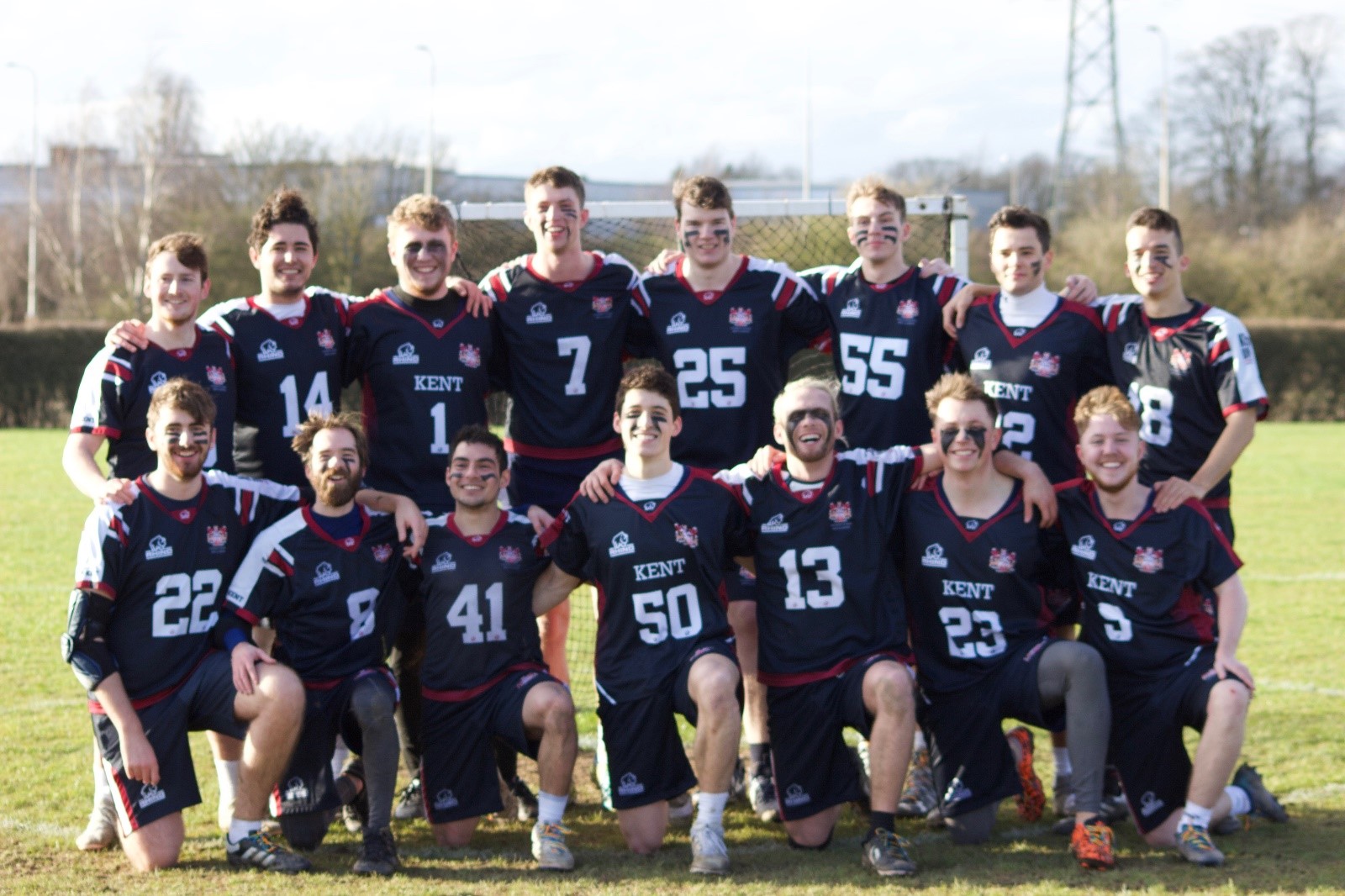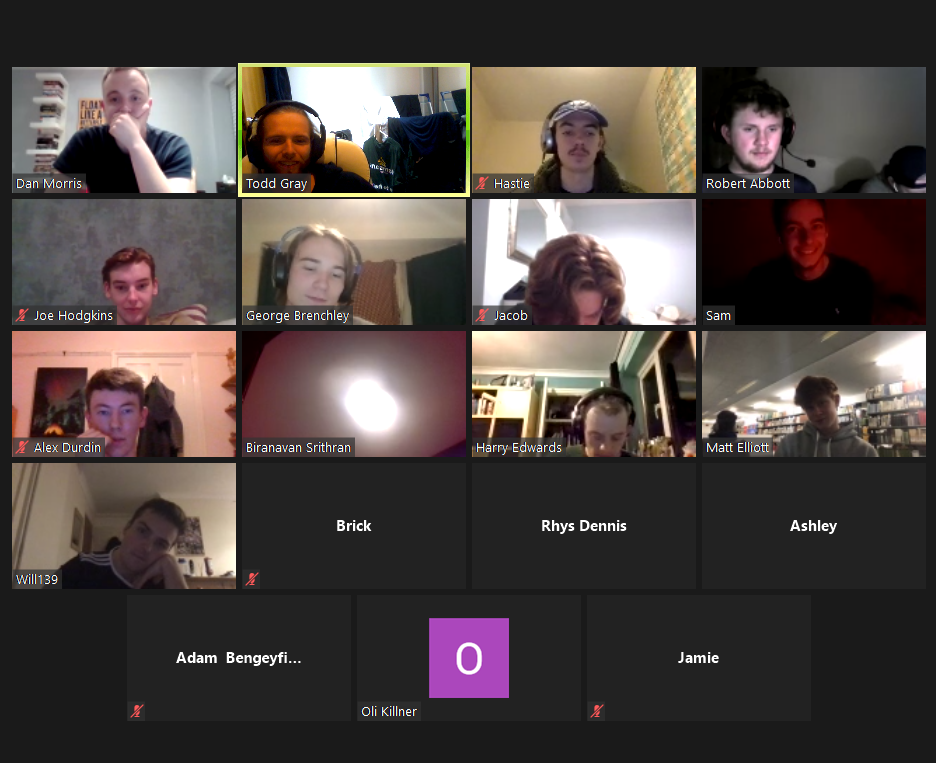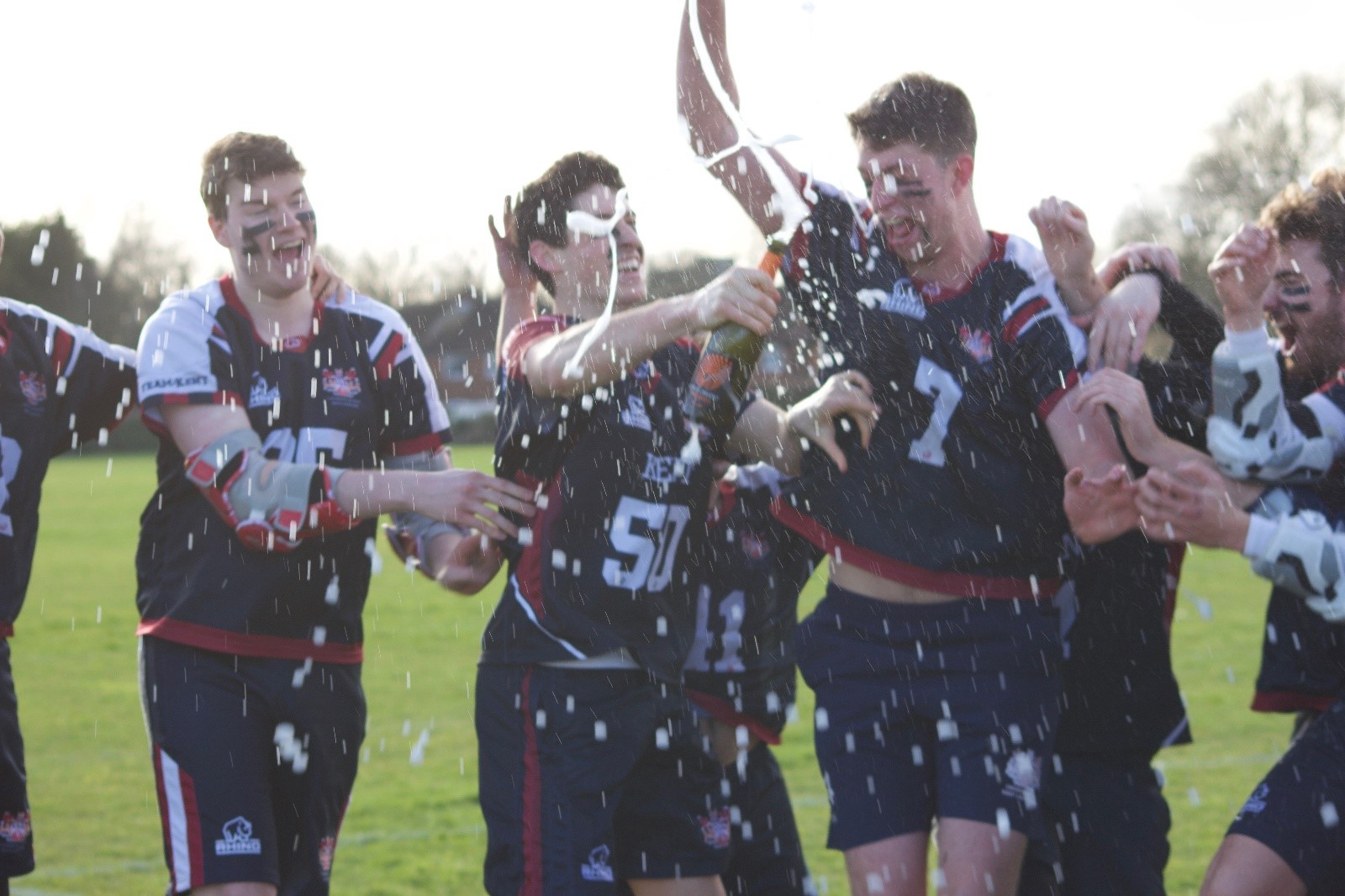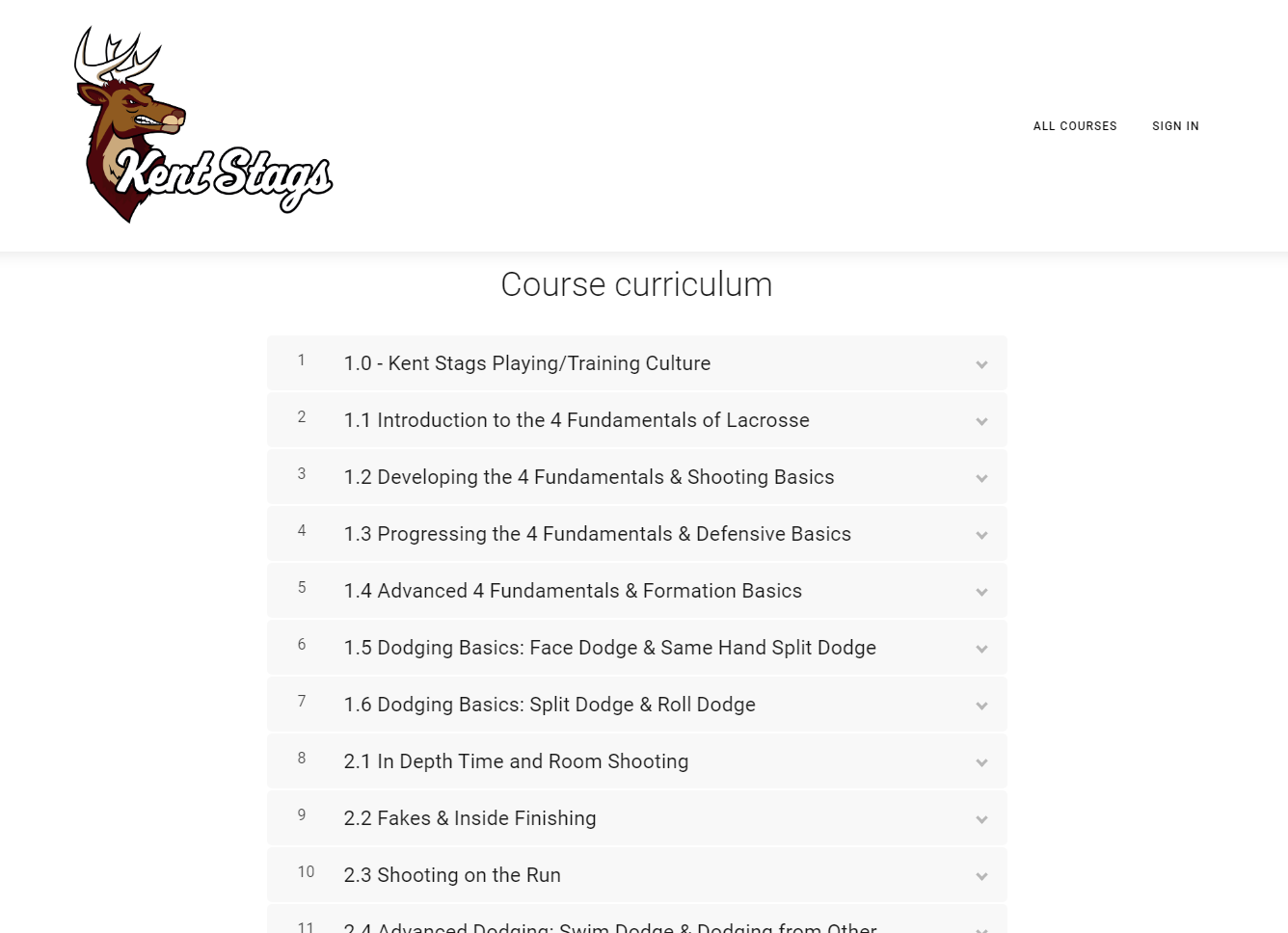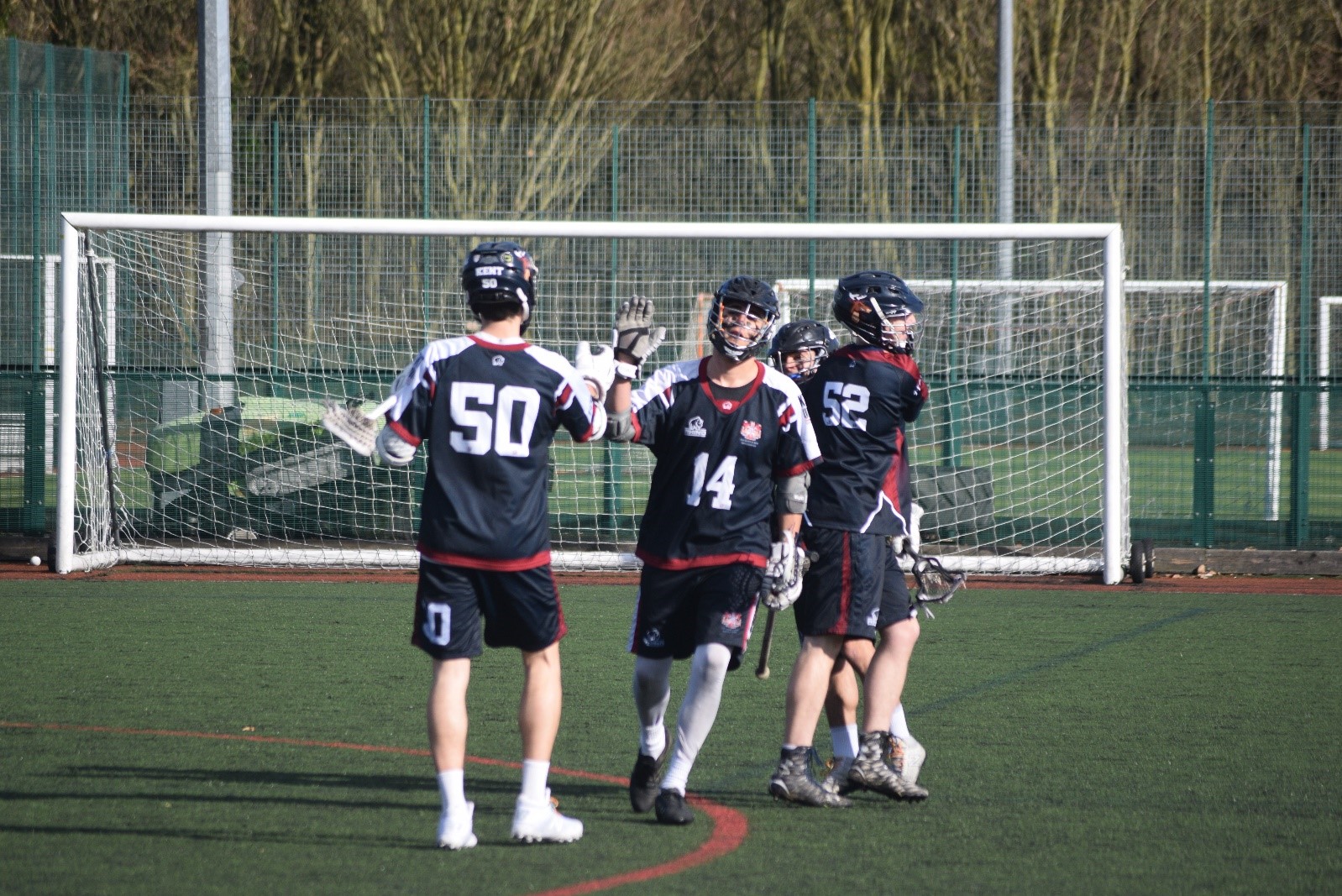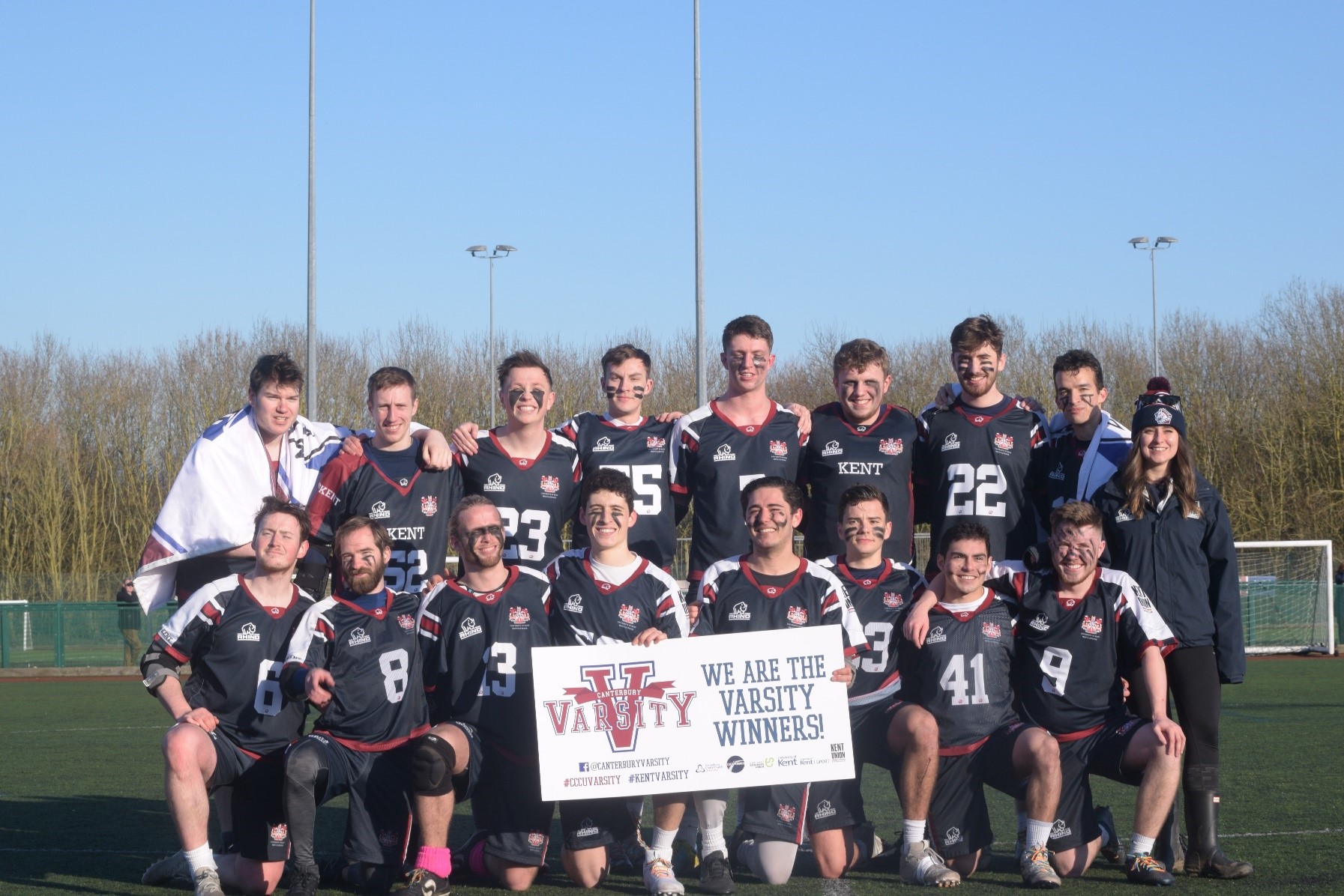Todd Gray is a current Sports Scholar for lacrosse – we interviewed him recently about the sport and where he sees the club going in the future.
What were your sporting ambitions whilst growing up and before arrival at University?
Despite the fact I’d grown up playing a variety of sports, I didn’t encounter Lacrosse at all until Uni. My personal drive to become elite really started in my early teens with Judo, where I was able to work my way up to competing at a national level before I discovered Muay Thai & MMA towards the end of high school. This quickly became my new passion, with my ambition being to apply the lessons I’d learned from Judo and become the best in the world. I went undefeated in a string of fights, but with gap year travel & then university calling I ultimately decided to put fighting seriously on the shelf.
What are you studying at Kent and what are your career ambitions after graduation?
I’m currently studying MSc International Business & Management and my main career goal is to become a highly effective chief executive within a multinational company. I originally studied Politics & International Relations at undergrad, but through being involved in sport at Kent – specifically the board of UKC Men’s Lacrosse – I’m fortunate to have had the opportunity to discover a passion for leadership & management.
Being chairman of UKC Men’s Lacrosse has provided an incredible opportunity to develop a skill set for both leadership & management that has been battle tested outside of the classroom. I’ve been privileged enough to be one of the leaders responsible for helping build our club into a closely knit brotherhood that truly benefits its members in all kinds of ways, despite the unique challenges of the past 12 months. Not only has this been extremely rewarding, but it has also given me rock solid confidence in my personal ability to create value within the professional world – confidence which I never could have truly gained through studies alone.
How did you get into your sport and not get distracted by other more traditional English sports growing up?
I’d played a lot of the classic English sports growing up, and whilst I enjoyed most of them, I wasn’t ever too motivated to pursue any sport seriously until Judo in my early teens. I think part of the reason for this was that despite being extremely competitive as a kid, I was never a “natural” superstar player, and since I didn’t really understand how to learn yet, I believed elite sporting ability was some mysterious god given gift which I’d missed out on. As I got older, Judo, being a non-team sport, provided me with a clear opportunity to learn how individual success is 100% under your own control, and my competitive nature led me to quickly become hooked on trying to be the best I could.
Upon arriving at Uni I knew I wanted to be part of a sports team, but found that after years dedicating myself to Judo and then Muay Thai/MMA, most traditional non-contact sports didn’t really give the same rush as fighting did anymore. Despite having never heard of it previously, I was drawn to lacrosse after being approached at Freshers Fair and seeing the sport’s fast paced, high impact, and excitingly flashy gameplay. I was also drawn to the sport since the overwhelming majority of players have never played before Uni, the opportunity to reach the highest standard after a relatively short time playing is massive – as opposed to more traditional sports like football or rugby where often you’re competing for places against players who have played for years.
You joined the scheme as a Masters Student, where did you complete your undergrad and is this when your Lacrosse journey started?
I studied my undergrad at Kent and signed up for the lacrosse team at the Freshers Fair of my first year. The first time I held a lacrosse stick was at a taster session on the weekend of freshers week after dragging myself to the Parkwood 3G extremely hungover – definitely one of the better choices I made that week!
How important is physical activity and sport in complimenting your studies at University and what advice would you give to new students arriving next year and looking to engage in a new sport such as Lacrosse?
Do it. I personally believe that some dedication to sport – or at least physical activity – is an essential part of being a well-rounded student. I couldn’t imagine university without being a member of lacrosse. On top of the more obvious purely fun element that comes with being part of a Uni sports team like lacrosse, anyone who’s been in or around the university environment for a while will be able to speak to the importance of physical exercise in maintaining mental wellbeing, which, if neglected, can completely derail your studies – even more so now as everyone deals with the wellbeing hangover of the pandemic.
As we come out of a year spent indoors, it would be a shame to miss out on all the opportunities to be part of a sports team at Kent; opportunities that will help you make the most of your time at Uni, and also help you stay healthy & active throughout any more lockdowns and your time here regardless. Taking our club as an example, during the pandemic we’ve been active the entire time with social calls, online trainings, and initiatives to keep our members fit and healthy through individual training; which has been in addition to implementing a Health & Nutrition Coordinator who’s role includes helping any of our members who may be struggling with their mental wellbeing get the guidance and support they need.
Putting health and wellbeing to one side, being committed to a sport like lacrosse at uni will give you so many other benefits. Along with just being incredible fun, during my time as a part of lacrosse I’ve witnessed in myself and in other members of the team how overcoming adversity within a competitive sporting environment will give you self confidence that carries over to life beyond the pitch; how learning new skills and tactics at training can prove to you how capable you are of understanding & mastering even things that originally seemed completely foreign to you; and also how being a committed member of the team & celebrating massive wins with your teammates after giving everything you’ve got on the pitch, will help you forge the type of lifelong friendships that are difficult to find anywhere else.
Can you explain the team formation and dynamics for a Lacrosse novice and your role/position within the teams you play for?
The common way lacrosse is often described is that it’s a “full contact game of field hockey in the air,” although the sport also combines elements of ice hockey, basketball, and American football. Sounds confusing but trust me, it’s really not. In lacrosse players throw and catch the ball using sticks with small nets on the end, allowing us to move more quickly and dynamically, leaving plenty of room for creativity and flair on offence, as well as big hits from defensive players.
Men’s lacrosse is played with 10 players from each team on the pitch at any given time: 1 goalkeeper, 3 defenders, 3 midfielders, and 3 attackers. Lacrosse is known as “the fastest game on two feet” and as a result substitutions are roll on roll off, similar to ice-hockey. In BUCS during non covid times teams can bring 20+ players to fill their benches, although currently that number is reduced to 13. Similar to in American Football, US teams will bring the entire population of a medium sized village for their benches, since their massively funded college programs have depth of numbers not seen in the UK.
In theory any player can run anywhere on the pitch, but generally attackers stay in the opposing teams defensive half, and defenders stay in their own defensive half, with midfielders going back and forth between both. This is because the offside rule in lacrosse is that no team can have more than 7 players in their defensive half at any time (3 defenders + 3 midfielders + 1 goalie), and no team can have more than 6 players in their offensive half (3 attackers + 3 midfielders).
There are specialist positions within these categories; for example, my personal role is what’s known as a “face off guy,” a midfielder whose job it is to take faceoffs (a faceoff being how the game is restarted, think a tip off in basketball except it’s a 1v1 scrum on the ground). Some midfielders will be specifically offensive midfielders or defensive midfielders that sub off/on for their respective speciality, but because the movement in lacrosse is so dynamic there aren’t really set positions like you might find in other sports, for example “left back” or “right winger”.
We explain the structure and the history of our sport in more detail on our website, here: https://www.kentstags.com/oursport
Can you explain the subtle differences between male and female Lacrosse and how beginners might get involved in your sport?
Unlike many other sports where the male and female versions are the same, men’s and women’s lacrosse have two entirely different sets of rules. The men’s game is full contact and as a result the “nets” of our sticks have deeper pockets to prevent the ball from being so easily dislodged, which in turn means we are able to shoot a lot harder – professionals can shoot at speeds of over 115mph. This also means we have to wear helmets, since a solid rubber ball in the back of the head travelling at 115mph would be less than ideal, and the piece of my front tooth that’s probably still somewhere on the parkwood 3g can tell you neither is getting smacked in the face with a metal pole. Girls don’t play with contact and so they don’t have to wear helmets or gloves etc. However, at the highest level the women’s game is incredibly dynamic and fast paced, made all the more impressive by the fact their sticks are far more difficult to use.
Any beginners looking to get involved should get in touch with us either through email or our social media, which are all found on our website, here: https://www.kentstags.com/join. Our club is predominantly students but we’ve just started a men’s team to play on Saturdays too which is open to all. All abilities are welcome; as mentioned previously very few of our members have played the sport prior to coming to university, and this year we’ve developed a structure to bring complete beginners up to a regional level within their first year of playing. This includes our own online course which teaches all the key skills and tactics of lacrosse in order they are best learned, online training sessions and film reviews, and individual training guides found within the exclusive members area of our website.
Lacrosse is huge in North America and is a staple at US Universities and Colleges, how much has the sport developed in the UK/Europe and what does the future hold?
The women’s game is relatively big across the entire UK, especially within private schools, but the men’s game is currently only quite popular up north for some reason. The main exposure people get to lacrosse in the UK is at university, where the sport thrives simply through how much fun it is, versus in school/college where the equipment being quite expensive to buy en masse is a major disincentive to teach the sport for state funded schools – for example, a PE class of thirty kids would each need sticks, balls, helmets, gloves, etc. for a lacrosse lesson vs a few footballs or a rugby balls for a football or rugby lesson.
Something else that definitely holds lacrosse in the UK back is that it carries a stereotypical image of being exclusively for posh upper class types, which is absolutely hilarious to those of us on the inside, since the UK lacrosse player base is an entirely mixed bag of people from all walks of life who usually started playing at Uni – not Eton. I’m personally from a working class family in Hereford and other than some of the southern types in the team thinking words like grass are pronounced “grahhhhsss”, I can tell you for a fact the sport and its accompanying “lax bro” culture are both about as far from snooty and exclusive as you can get.
All that being said, the common theme with everyone who actually gets to try the sport is that they love it. The gameplay itself combines a whole load of elements that make other mainstay British sports so popular: its fast, its gritty, there are big hits, there’s plenty of room for flair – the “product” itself isn’t the issue, it’s just a case of increasing awareness, availability, and accessibility. Thankfully our NGB, England Lacrosse, has been working hard to grow the game within the UK, and also the sport has recently been accepted into the Olympic Games, which in tandem with the growth of the new Premier Lacrosse League in the US should hopefully further help the UK with developing what is already one of the fastest growing sports in the world.
We hardly ever see Lacrosse on the television or the media, what needs to happen for this sport to get more recognition?
A lot of great work with regards to increasing television coverage is being done by the new Premier Lacrosse League (PLL). The PLL was formed from the shambles of a league that was Major League Lacrosse (MLL) and has completely changed the face of the sport worldwide – the MLL being the old “professional” lacrosse league where the majority of players had to work a day job because they didn’t make enough from playing.
Players in the PLL are now properly salaried and their PR team does an amazing job of showcasing the sport in a way that appeals to anyone that can appreciate high level sport, as well as dedicated fans. As the PLL expands and the sport gets Olympic coverage, I personally don’t believe it will take long until the sport gains a hell of a lot more recognition, simply because of just how entertaining it is – once again, this is speaking as someone who had no idea what lacrosse was only a few years ago.
You are heavily involved in the Lacrosse Club at the University of Kent, can you explain how the Club is structured, current member numbers and your role within?
Our club currently has around 35 paid members, with a far broader community of members that includes those either away on a year in industry or players who have graduated. We currently have 2 competitive BUCS teams, with our first team coming off of an undefeated 2019/20 season where we won the league, cup, and varsity. My personal role within our club is chairman; I’m responsible for driving the strategy of our club and ensuring our overall success in achieving short and long term goals. Our club is run by a relatively large board of volunteer members, who all work together where necessary, but can be broadly categorised into 2 groups: Sport and Society.
The sporting element of our club contains our Captains, our Development Coordinator, our Strength and Conditioning Coordinator, our Health and Nutrition coordinator, and is overseen by our Sports coordinator. The society side contains our Treasurer, Social Secretaries, PR Coordinator, Charity Coordinator, Events Coordinator, and is supervised by our Vice Chairman. Whilst we sort individual tasks and meetings with whoever is relevant, our board meets every two weeks to check in and bring everyone up to speed, posting summaries of our meetings for all club members to see. We’ve found that given the voluntary nature of our club’s board, through sharing the workload across a relatively large number of people, we have been extremely effective in developing our club despite the challenges of this year.
2020/21 has been a unique year for all sport but particularly for Student Clubs with very little access to playing time – firstly what have you and your Club Members done to stay active during the various Lockdowns?
Starting last year at the beginning of lockdown, our club created a chat for development in which we asked that members post videos of their training for the purposes of critique, others to learn from, and also to motivate others to train. We made a leader board which is posted in the chat each day and found on the members area of our website, which keeps track of all the training our members have done including wall ball, skills training (eg footwork drills), and workouts, as well as attendance at team calls which we put on each week. During periods when restrictions have been relaxed we’ve been able to organise informal sessions amongst small groups, still making sure training was recorded for the leader boards. Our training chat has been so successful for our club that we’ve had over 5000 contributions to the leader board since its inception, and are aiming for 10000 by the end of the year.
In addition to the training leaderboard, our club introduced an S&C Coordinator as a position on our board, who has provided our members with workout routines and basic nutritional advice, including workouts that can be done at home with minimal equipment, in order to keep our members active and physically fit. Our club has also used charitable ventures as a means of keeping our members active, starting with our participation in the Race to Porec charity event last March which involved members running with total distance being recorded as a team; Movember which again involved running for charity, as well as a 24 hour passing challenge fundraiser; England Lacrosse’s “bouncing off the walls” wallball challenge; and our ongoing “walk all over cancer” campaign. These campaigns have not only helped our own members, but have also meant we’ve collectively raised over £5000 for charity so far this year.
The challenges of Covid-19 have limited physical engagement as well as practical participation but what initiatives has your Club implemented to keep Club Members engaged virtually and in particular support new members?
Even after the first lockdown, our commitment to keeping the club running at full steam has continued throughout the year, despite the limitations on physical contact. This has included adapting baseline club operations, such as having zoom socials each week when physical socials would have normally been, online training sessions each week when physical training would have normally been, and the training leader boards.
However, we wanted to go beyond what we would have normally done, and so our virtual efforts expanded to include the production of our online course, which is free to our members and teaches all the major aspects of lacrosse needed to go from complete beginner to regional/national level in the UK; the construction of a website with a private members only area containing all club resources – for example workouts, drills, equipment guides, sport rules, information on how to stay healthy, club updates and more – and the reorganisation of the already existing training chat into a 1’s and 2’s chat in which members are able to move up or down based on their commitment to developing themselves as players, rather than just being assigned a team for the year based on how long they’ve been in the club for.
As a result, despite never having set foot on a pitch, some of this year’s new recruits now have better fundamental skills and understanding of tactics than previous 1st team players have graduated with – certainly better than my own fundamentals prior to this year – and are poised to become some of the greatest players our club have ever produced.
Despite the frustrations this year I know you and your Club are looking to improve the experience for Lacrosse members and establish a ‘Focus Sport’ status and mentality amongst other University Clubs – what are the Clubs’ short and long term ambitions going forward?
Simple: our long-term ambition is to become the best university lacrosse program in the UK, whilst also providing our members with the best social experience on campus, and creating a community where our members seek to support each other in succeeding. In the short-term, our focus is on continuing to develop the skill of our members & the culture of our club, as well as securing the financial backing we need to be able to expand and turn Southeast lacrosse Kent navy.
To aid with these goals, we have organised an unofficial friendly league to act as a substitute for the cancelled BUCS in summer term, along with having provisionally secured friendly SEMLA fixtures on Saturdays for when matches resume. This is to give our lads an opportunity to put their hard work over lockdown to the test in game situations before we make a push for promotion to the Premiership in this upcoming 2021/22 BUCS season. Beyond BUCS, we are looking not only to be equally as successful in SEMLA fixtures on Saturdays, but also to use our team as a vessel through which we can make links within the local community, and use our club’s resources to help grow the game of lacrosse from a grassroots level.
Whilst Covid-19 and its accompanying restrictions have sadly been a coup de grace for many sports teams nationwide – and many lacrosse teams specifically – we’ve been extremely fortunate to have not only found opportunity within the chaos, but to have had a team of members with the commitment, ingenuity, and drive that has enabled us to capitalise on that opportunity in an incredible way. Having had the pleasure of spending this year training and working alongside the men that will be the future of our club, there is no doubt in my mind that during the years which follow we will achieve our goals, and Kent will establish itself as a dominant force within UK lacrosse. We’ll see you there.
If you’re interested in becoming a sports scholar at the University of Kent, check out our Scholarship webpages for more information.

